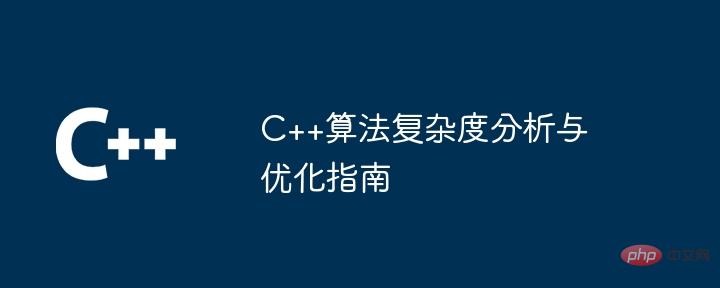
Algorithm complexity indicates algorithm efficiency and describes the execution time and storage space requirements of the algorithm. Common expressions of algorithm complexity are time complexity and space complexity. Asymptotic analysis, average case analysis, and worst case analysis are three ways to analyze the complexity of an algorithm. Common techniques for optimizing algorithm complexity include the use of data structures, caching, greedy algorithms, dynamic programming, and parallelization.

C++ Algorithm Complexity Analysis and Optimization Guide
Algorithmic Complexity
Algorithmic complexity represents a measure of algorithm efficiency, which describes the time or space requirements of an algorithm at different input sizes. Common algorithm complexity representations are:
Complexity analysis method
Complexity Optimization
Common techniques for optimizing algorithm complexity include:
Practical Case: Finding the Maximum Element in an Array
The following example shows how to analyze and optimize the C++ algorithm for finding the maximum element in an array:
// 暴力搜索,时间复杂度 O(n)
int findMax(int arr[], int n) {
int max = arr[0];
for (int i = 1; i < n; i++) {
if (arr[i] > max) {
max = arr[i];
}
}
return max;
}
// 改进后的算法,时间复杂度 O(n)
int findMaxOptimized(int arr[], int n) {
if (n == 0) {
return INT_MIN; // 空数组返回最小值
}
int max = arr[0];
for (int i = 1; i < n; i++) {
if (arr[i] > max) {
max = arr[i];
break; // 一旦找到最大值就停止循环,优化时间复杂度
}
}
return max;
}Optimization results: The optimized algorithm improves efficiency and reduces time complexity by stopping the loop early when the input array contains the largest element or is close to the largest element.
The above is the detailed content of C++ algorithm complexity analysis and optimization guide. For more information, please follow other related articles on the PHP Chinese website!
 What are the differences between c++ and c language
What are the differences between c++ and c language
 Recommended learning order for c++ and python
Recommended learning order for c++ and python
 Cost-effectiveness analysis of learning python and c++
Cost-effectiveness analysis of learning python and c++
 Is c language the same as c++?
Is c language the same as c++?
 Which is better to learn first, c language or c++?
Which is better to learn first, c language or c++?
 The difference and connection between c language and c++
The difference and connection between c language and c++
 C++ software Chinese change tutorial
C++ software Chinese change tutorial
 Cost-effectiveness analysis of learning python, java and c++
Cost-effectiveness analysis of learning python, java and c++




